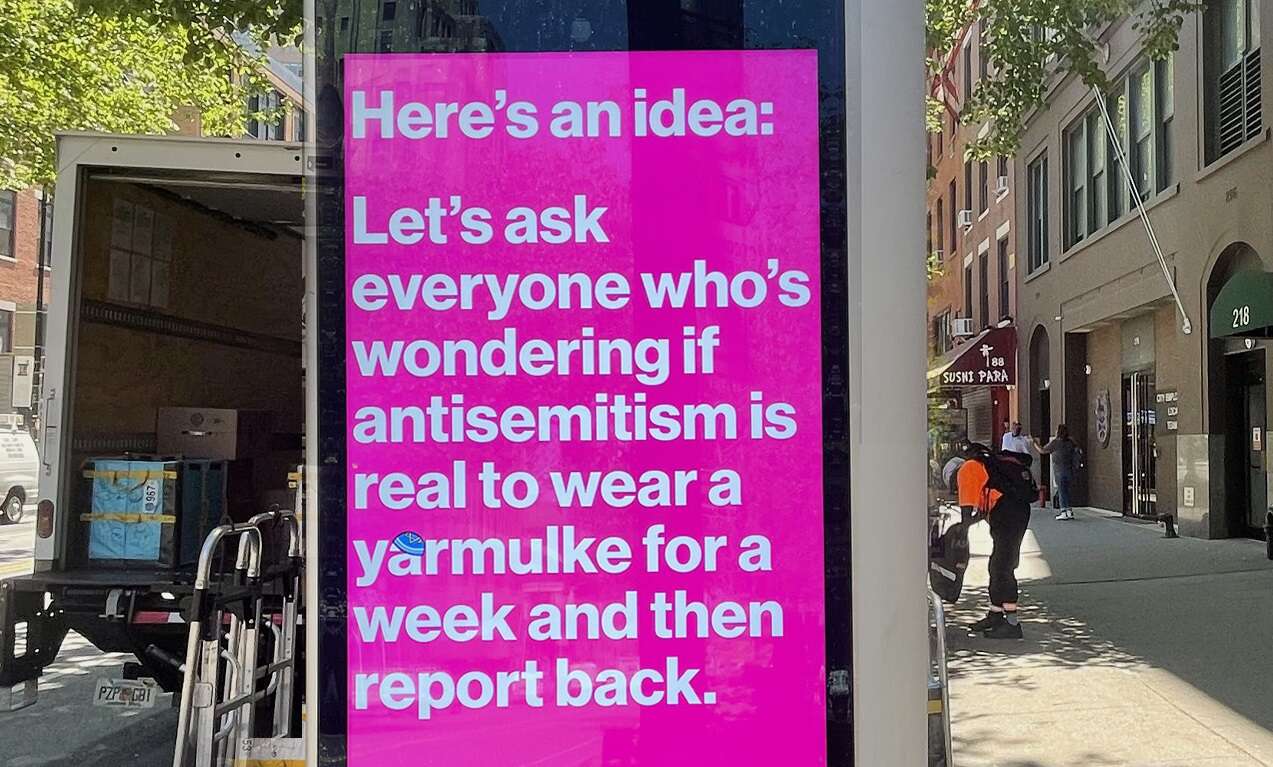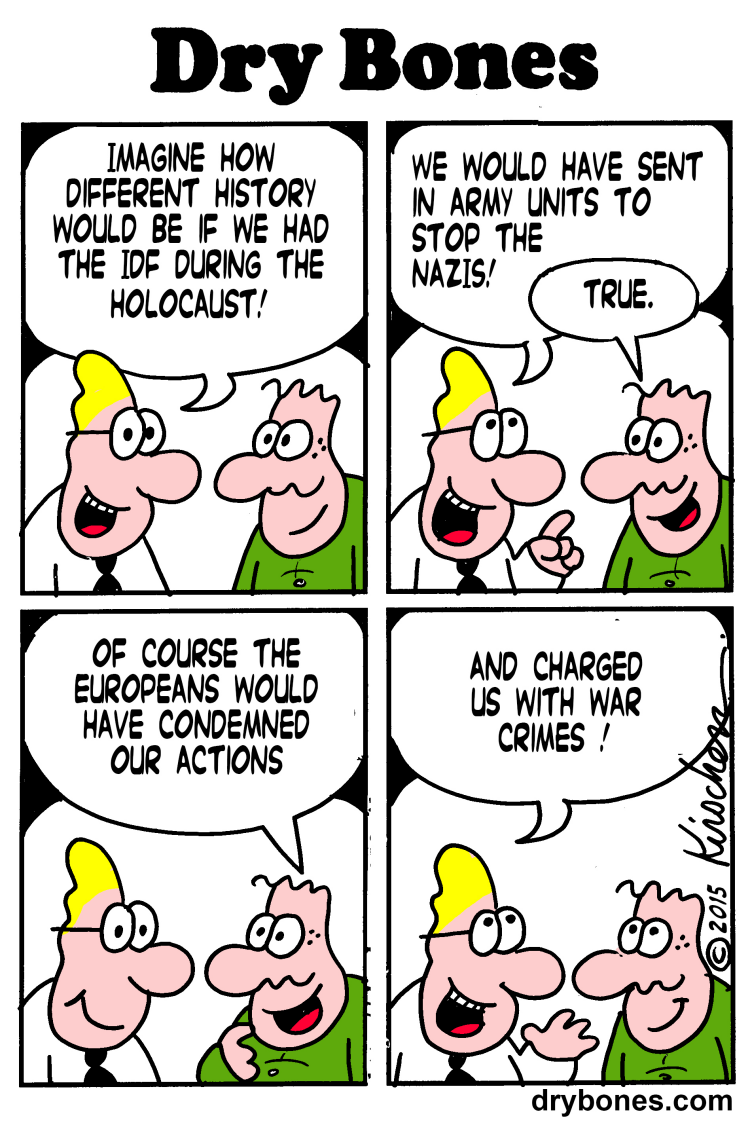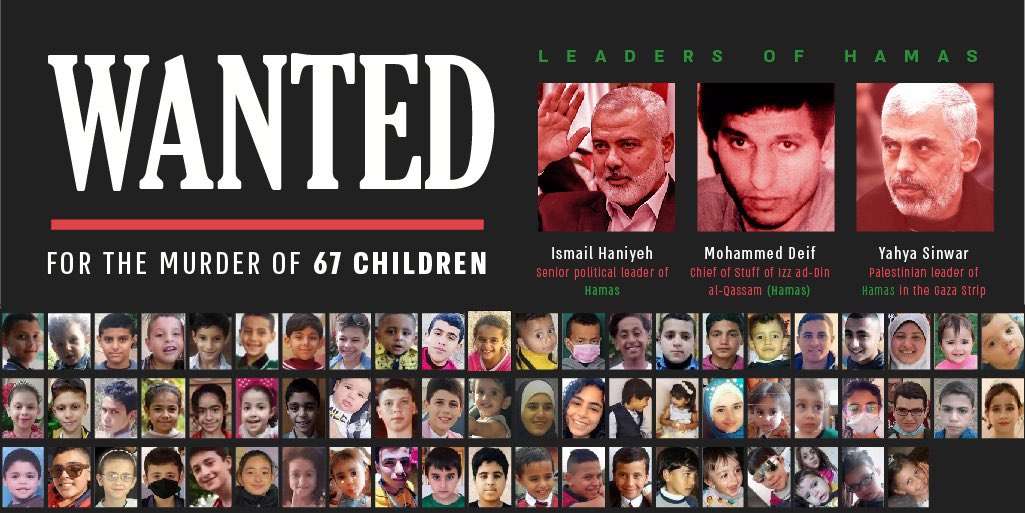'If you don't think antisemitism is real, wear a yarmulke for a week'
With antisemitism on the rise in US and worldwide, and given the overwhelming amount of hate and misinformation, particularly on social media, JewBelong has inaugurated a campaign titled "JewBelong or Jew BeGone."
The group has taken out 750 somewhat tongue-in-cheek digital ads running across Manhattan that read, "Here's an idea: Let's ask everyone who's wondering if antisemitism is real to wear a yarmulke for a week and then report back."
The campaign is slated to run through at least July, beginning with LINK digital ads, and then adding billboards and print posters in high traffic locations such as PATH Trains and Times Square. The campaign will also run in Chicago, Philadelphia, LA and other cities with other messages. The objective of JewBelong or JewBeGone is to elevate awareness about the rampant recent antisemitism and to encourage dialogue, support, and community awareness.
As part of the battle against antisemitism, JewBelong also announced the Jewish Partisan Prize to recognize influencers who are standing up against antisemitism on Instagram and other social media platforms.
Julie Burchill: The problem with Palestine’s showbiz supporters
Recent events in the Middle East – basically Hamas wanting to kill most of the Jews in Israel, and most of the Jews in Israel stubbornly refusing to hold still and be killed – have got the chorus line hopping over here too, causing Dame Maureen Lipman to resign from the actors union Equity after it backed a pro-Palestine demo at which anti-Semitic banners were displayed. Tracy-Ann Oberman revealed that she had received messages from young actors telling her that they didn’t want people to know they were Jewish, such is the current climate of hostility in the profession. It’s like being back in the 1930s, with anti-Semitism on the rise all through Europe and Hollywood having to christen (literally) the actress Betty Weinstein Perske as Lauren Bacall.Matti Friedman: Theodor Herzl Is Alive and Well and Living in New York (Los Angeles, Paris, and London, too)
Show-business types are notorious for their desire to get drunk, sleep around and be homosexual. I’m not knocking it – it’s what makes them so much fun to hang out with. But why then are they throwing their weight behind a movement wherein music is haram and ‘break a leg’ isn’t a blessing but something Hamas might do to gays? No matter what contortions a performer might have learned at circus school, you cannot support both gay rights and a Palestinian state; the only place in the entire region where people are free to be gay is Israel. As for women’s rights, the Morality Police in the Palestinian Territories have arrested women for laughing. Admittedly that’s not going to be a problem for the terminally po-faced Hadid chicks. But as we’ve seen from the fate of Iranian women and Afghan schoolgirls, your average Islamic state is so lacking in diversity and inclusivity that it makes Rhodesia look like Narnia.
I daresay that Gigi, Bella and Dua want only the best for the residents of the strife-torn region. But if Palestine ever is free ‘from the river to the sea’ it won’t be ringing with the sound of Dua Lipa songs and adorned by ad campaigns featuring the Hadid sisters. It will be a place where gay men must live a lie or face execution and where women are treated like a cross between children and chattel. But that won’t bother the showbiz supporters of Palestine – they’ll already be looking around for the next conflict where they can step in and screw things up even more with their #BeKind hashtags – and their hearts full of illogical loathing for a people, the Israelis, to whom bravery consists of a bit more than doing two performances on a Saturday.
Unlike most of his learned Jewish contemporaries, Herzl understood that antisemitism can’t be pled or reasoned away
The prosperous Jews of Vienna, who assumed that this problem was on its way to being solved, are surprised to find themselves the focus for the anxieties of the age. They’re caught off guard in their colleges, law firms, and factories, midstep on their journeys toward assimilation. “Jews were baffled and shocked by this obsession,” Elon writes. “Should they react to the attacks or ignore them? Was it something they had done? Many sensitive young Jews were tormented by these questions. Rich Jews tended to blame poor Jews, and vice versa.”
The correct attitude among Jewish intellectuals, Herzl’s social circles, was to cringe at both rich and poor, affecting a very Viennese attitude of wry fatigue with the foibles of humanity. The writer works for the Neue Freie Press, the New York Times of the empire, a newspaper of careful Jews who are celebrated for their brilliance, hampered by their social aspirations, and wrong, in retrospect, about everything. We don’t know that yet. Herzl’s plays are produced in Berlin and at the best theater in the city. Progress might not be smooth, but it is inevitable.
And yet society becomes increasingly preoccupied with the “bad manners” of the Jews. There are many people with bad manners, but the Jews stand out, “because of the obsessive interest in their lives and the general belief in the existence of a ‘problem,’ which even Jews paranoically began to share themselves.”
Books appear seeking to analyze the Jews’ warped character and physiognomy. This isn’t primitive hatred of Jews like in the days of the Church and the ghetto. This is science. As a young man Herzl reads one such book—Eugene Duhring’s The Jewish Question as a Racial, Ethical, and Cultural Question—and allows it briefly to penetrate his consciousness, mentioning his troubled emotions in his diary before relegating it to the back of his mind. One of the most toxic tracts would eventually be written by a Jew by the name of Otto Weininger. Like all Jews willing to attack other Jews, Weininger was borne upward on a strange, grateful tide of popularity, before taking his critique to its logical conclusion and killing himself. “When a number of frightened Jewish scholars publicly endorsed the new ‘scientific’ antisemitism and admitted the ‘biological’ inferiority of their race,” Elon writes, “other Jewish wits replied that ‘antisemitism did not really succeed until the Jews began to sponsor it.’”
Viennese politicians begin understanding how effective this hatred can be as a mobilizing tool. The dark word “they” comes into use—everyone knows who “they” are.
The most adept of this breed is Karl Lueger, who rides Jew-hatred into power but has Jewish friends. “I decide,” he famously declares, “who is a Jew.” It’s a type becoming familiar in our own time. Jews like Herzl believe that the genteel people in the palaces and grand townhouses of Vienna are in control of events, and that culture will thus prevail. But power is shifting to the gutter.










































